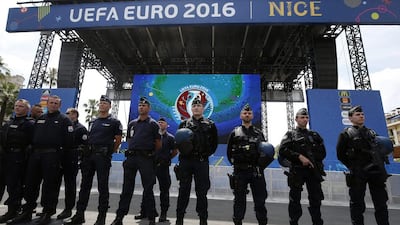MARSEILLE // Euro 2016 kicks off at the Stade de France on Friday night, with the international football tournament marred by fears of terrorism and disruptive strikes.
France has been in a self-declared state of emergency since ISIL attacks killed 130 people in the capital on November 13 last year.
Terror suspects have been arrested in both Ukraine and Germany in the past two weeks, with at least one suspect believed to have been planning attacks in France during Euro 2016. While these arrests represented major security successes for European security forces, they also raised fears that more extremists could be planning to attack the tournament.
Meanwhile, after months of labour-related unrest across France, concerns are high that public transport and other services could be hit in the 10 cities where games are to be played.
Trade unions, who are angry at new employment laws, refused to lift strikes as severe flooding hit Paris and several other areas and have made it clear they are more likely to step up, rather than suspend, industrial action for Euro 2016.
Railway workers and Air France pilots are among many groups currently staging or planning strikes to take place during the tournament.
“I love football but our conditions of work are more important,” one train driver, Fabien Villedieu, told the France 2 television channel.
The French Sunday newspaper Le Journal du Dimanche summed up the apprehensive mood of the nation with the headline: "The euros under very high tension."
On a more upbeat note, it also asked whether France’s morale – battered by terrorism, natural disaster and social turmoil – would be lifted by football as it was when the country hosted the 1998 World Cup and won it in style.
The 1990s were also marked by problems of terrorism, strikes and troubled community relations. Idealists hoped the famous “Black-Blanc-Beur” (Black-White-Arab) spirit of the racially mixed squad that beat Brazil 3-0 in the 1998 final would diminish racism and promote tolerance. The star of that first French World Cup-winning team was Zinedine Zidane, born in Marseille to Algerian parents. Affectionately nicknamed “Zizou” he became an instant national hero and his image was projected on to the Arc de Triomphe in Paris with the words, “Merci Zizou”.
But according to a prominent French sports sociologist, Ludovic Lestrelin, the mood of fraternity lasted only one summer. “This team was seem as reflecting diversity, but it was a totally reconstructed, artificial proposition,” Prof Lestrelin wrote on his website.
In the run-up to the start of Euro 2016, the arrests of terror suspects in Germany and Ukraine has done nothing to calm fears.
Ukraine’s security service (SBU) said on Monday that a 25-year-old French citizen detained late last month with rocket launchers, Kalashnikovs and explosives in his vehicle had been planning attacks in France during the tournament. He had nothing to do with ISIL but was an extreme right-wing supporter intending to attack targets that included Jewish and Muslim places of worship, according to SBU chief Vasyl Hrytsak.
Last week, three Syrian nationals were detained in Germany on suspicion of planning a mass casualty attack in the city of Düsseldorf.
There were conflicting reports on whether the three, along with alleged accomplices still at large, also had their sights on Euro 2016. German authorities insisted they did not but a month earlier Hans-Georg Maassen, head of Germany’s Federal Office for the Protection of the Constitution, had said: “We know that Daesh has the European Championship in its sights.”
In the face of these challenges, France has launched one of the biggest security operations in its history to ensure the event passes off without incident.
The number of soldiers on duty during the tournament will rise by 3,000 from the 10,000-strong deployment announced after last November’s attacks, but the total number of troops, police and security guards tasked with protecting the event is likely to exceed 90,000.
Supporters visiting “fan zones” – areas designated for ticketless fans who wish to be part of the occasion – in Paris and the other cities where games are being played can expect detailed searches.
“It’s important that spectators arrive as far in advance as possible,” Paris police chief Michel Cadot told the France 24 news channel.
“The fan zones and the stadiums are open in advance, far in advance for the fan zones, three hours ahead for the stadiums. So the recommendation for the public, for fans in the stadiums, or those in fan zones, is not to go to those areas at the last minute.”
Mr Cadot conceded that it was impossible to rule out any risk.
“It’s a difficult period with attacks that could hit our country anywhere,” he said. “But yes, I think today we’re as prepared as we ought to be faced with this challenge.”
French president Francois Hollande insists the threat of terrorism will not stop Euro 2016 from being successful as a “festival for people and for sport”.
France, as the tournament’s hosts, play the first game against Romania at the Stade de France, just outside Paris, on Friday night. The hope is that by the time the final is staged at the same stadium on July 10, Euro 2016 will be well on its way to being remembered for the quality of football played – not for events occurring off the pitch.
foreign.desk@thenational.ae


